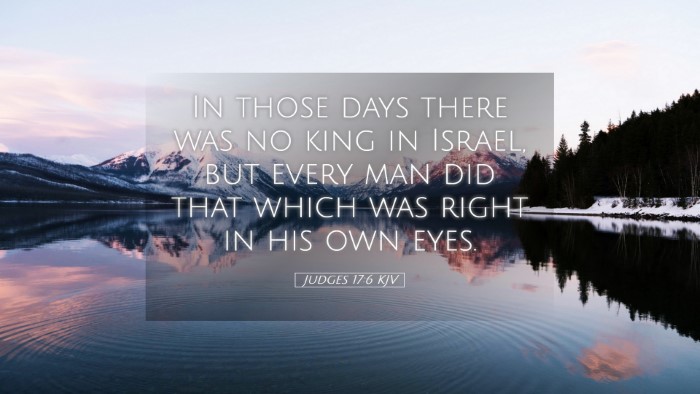Old Testament
Genesis Exodus Leviticus Numbers Deuteronomy Joshua Judges Ruth 1 Samuel 2 Samuel 1 Kings 2 Kings 1 Chronicles 2 Chronicles Ezra Nehemiah Esther Job Psalms Proverbs Ecclesiastes Song of Solomon Isaiah Jeremiah Lamentations Ezekiel Daniel Hosea Joel Amos Obadiah Jonah Micah Nahum Habakkuk Zephaniah Haggai Zechariah MalachiJudges 17:6
Judges 17:6 KJV
In those days there was no king in Israel, but every man did that which was right in his own eyes.
Judges 17:6 Bible Commentary
Commentary on Judges 17:6
This verse is pivotal in understanding the spiritual and moral landscape of ancient Israel during the time of the Judges. Judges 17:6 states:
"In those days there was no king in Israel, but every man did that which was right in his own eyes."
General Context
Judges 17:6 sets the tone for the chaotic period in Israel's history. This verse is symbolic of the anarchy that defined this era, emphasizing a lack of centralized authority and divine guidance. The absence of a king points to a vacuum of leadership which allowed for moral relativism to flourish.
Insights from Public Domain Commentaries
Matthew Henry's Commentary
Henry notes the crucial aspect of authority in governance and morality, indicating that without a king, there is also a lack of godly direction. He articulates that:
- The role of a king: A king was meant to provide guidance and uphold righteousness. In the absence of this authority, individuals followed their own whims.
- Moral deterioration: This self-governance leads not to freedom but to moral and spiritual decay, where personal desire usurps divine law.
Henry warns that such a state of affairs reflects the condition of humanity when it relies solely on human wisdom without divine counsel.
Albert Barnes' Notes on the Bible
Barnes provides a more historical perspective, detailing how the phrase emphasizes the need for a structured society. His insights include:
- Historical context: The Israelites were wandering in a state of spiritual confusion, with no unified leader or consistent adherence to the Law of Moses.
- Individualism versus collectivism: Each man's choice to do what "was right in his own eyes" illustrates a shift towards moral individualism that opposes the collective obligation to God's covenant.
Barnes highlights that this individualistic approach not only leads to personal sin but threatens the overall identity and unity of the nation of Israel.
Adam Clarke's Commentary
Clarke’s analysis focuses on the implications of the phrase itself. He discusses:
- Divine absence: Clarke notes that the lack of a divine king (God) on earth and an earthly king leads to lawlessness and ethical relativism.
- Consequences of autonomy: When individuals make themselves the authority, societal norms disintegrate, leading to grave sins, as each person may justify their actions according to personal feelings rather than objective truth.
Clarke strongly emphasizes the importance of divine law as the foundation for ethical behavior, arguing that disobedience to God's law leads to chaos.
Theological Implications
This verse serves as a critical reminder for contemporary believers about the nature of authority and morality. The absence of divine sovereignty effectively leads to spiritual anarchy, which is relevant in today's society as individuals often pursue personal truth over absolute truth.
Application for Pastors and Theologians
Pastors should utilize this scripture to affirm the necessity of godly leadership and biblical guidance within their communities. The importance of the church as a grounding institution in moral and ethical matters becomes clear:
- Encourage congregations to rely not on personal interpretations of morality but on God's word.
- Preach the need for accountability within Christian communities, reflecting a united front against the ethos of individualism.
Final Thoughts
In conclusion, Judges 17:6 is an enduring reminder of the consequences that follow when God is removed from the center of authority. It challenges pastors, students, and theologians alike to assess the sources from which they draw their ethical frameworks and calls for a return to recognizing God's sovereignty in every aspect of life.


